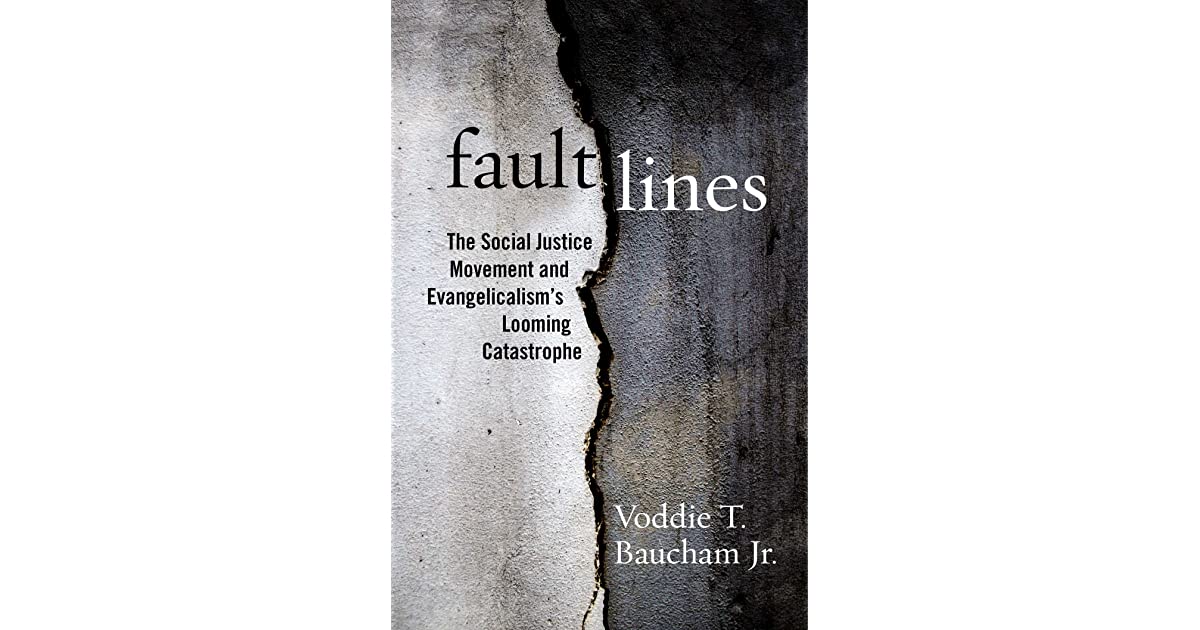Once in a while, a book rises up which brings clarity to a culture in chaos. In 1528, William Tyndale wrote a book on how a Christian should interact with the government entitled, The Obedience of a Christian Man. King Henry VIII is said to have delighted in it and exclaimed, “This is a book for me and all kings to read.”[1] Voddie Baucham, Jr.’s new book, Fault Lines: The Social Justice Movement and Evangelicalism’s Looming Catastrophe, is that type of book.
This is a book for me and all men to read.
Baucham addresses the motive and agenda of Critical Theory (CT), Critical Race Theory & Intersectionality (CRT/I), and Critical Social Justice (CSJ). These technical acronyms provide the substance of the “woke” movement we hear about in mainstream society. He argues that CT/CRT/I is not merely a different viewpoint or even a political viewpoint. Rather, it is a religious movement: the “Cult of Antiracism.”[2] This is precisely why every person must read Fault Lines. Before we embrace something which sounds appealing, we must know: (1) where and why it originated; (2) what it stands for; and (3) and what implications it has on the Gospel and Christ’s Bride, the Church. An honest reading of Fault Lines will serve as a great awakening from the deception of “woke” theology.
An honest reading of Fault Lines will serve as a great awakening from the deception of “woke” theology.
A Compelling Truth-Claim
In the most compelling sentence in the book, Baucham states, “I believe the current concept of social justice is incompatible with biblical Christianity.”[3] Such a seismic claim is one that many Christians affirm, but they have trouble articulating why.
Baucham justifies that claim with a diagnosis of the current condition of society (and evangelicalism), and he addresses that condition with the sword of biblical truth. The tentacles of CT/CRT/I run deep—through culture, history, economics, religion, social issues, families, and political theory—and Baucham skillfully extracts and exposes each tentacle in a remarkably coherent and understandable way. He buttresses his argument with original sources from academicians, historians, theologians, historical figures, media outlets, pop culture, social media platforms, and statisticians—all of which he filters through the lens of Holy Scripture.
8 Lasting Impressions
Even for one familiar with the CT/CRT/I philosophies, Fault Lines left me with several lasting impressions.
- In CT/CRT/I, racism is not predicated on the content of your character, but on the color of your skin. This is something white people still haven’t grasped. The “woke” rulers of this age assert: If you are white, it doesn’t matter if you follow Jesus’s “Golden Rule.” You remain a racist simply because you are white. In fact, they assert, “The sin of ‘systemic racism’ is imputed to you, and there is nothing you can do about it.” CT/CRT/I declares to whites: Racism is not “what you do.” Racism is “who you are.”
- CT/CRT/I is not merely a worldview, but a religion. This is, perhaps, where evangelical leaders have been hoodwinked. CT/CRT/I has its own view of sin, of law, of gospel, of new birth, of truth, of martyrs, etc. Baucham calls it the “Cult of Antiracism.”
- CT/CRT/I has gifted critical thinkers that provide intellectual girth to their assertions. These thinkers have crafted a brilliant strategy in which any objection or critique is seen as evidence their assertions are true. Baucham equally as brilliantly pinpoints the fallacies in their arguments. He casts light on the major CT/CRT/I academicians, their arguments, and their end-game.
- CT/CRT/I proponents muzzle objective truth. One new piece of information I gleaned is the scientific method now is deemed racist.[4] The reason why is because it is grounded in objective truth (facts, statistics, verifiable data, etc.), which leaves no place for the individual’s “personal experience.” This is unacceptable for CT/CRT/I proponents. Even a flier at the Smithsonian Museum of African American History now refers to the scientific method as “an element of whiteness.”[5]
- Trusted evangelical leaders are parroting CT/CRT/I academicians. The most surprising element of the book is the degree to which evangelical leaders quote, almost word-for-word at times, CT/CRT/I academicians and their views, many of which are incompatible with Holy Scripture. Unsuspecting souls (especially young people) who follow their social media accounts are being led into a cultic ideology with seemingly virtuous quips like, “If you say nothing, you are part of the problem,” and “Silence is violence.” Baucham, in a loving spirit and with gospel compassion, shows those quips arise from a legalistic foundation of heretical ideas incompatible with the Bible. Holy Scripture centers on “grace not race,” on “sin not skin.”
- These same evangelical leaders, perhaps unwittingly, have mixed biblical truth both with errors and with misplaced priorities. Part of the deception is CT/CRT/I’s appeal to Holy Scripture (when it suits them). They even claim to believe Paul’s cardinal doctrine of “justification by faith alone,” but they make a spiritually fatal error: They downgrade “justification by faith alone” from its central place of prominence in the gospel, and they upgrade other things. They essentially make absolute devotion to CSJ a litmus test or sacrament, as it were, for salvation.[6] They never deny “justification by faith alone” (which is what makes them so slippery). They simply don’t mention it. Rather, it is pushed aside for matters of greater urgency: racism. Once downgraded in this way, “justification by faith alone” filters farther and farther away from the nucleus of the gospel until it becomes a different gospel altogether.
- CT/CRT/I is a “plug and play” model. When the prevailing worldview is defined in terms of “oppressed” vs. “oppressors,” the same arguments that work for race also apply for gender and sexuality. The implications on the Church are obvious. Step 1 is to condition us to these radical ideas through the highly emotional “race” debate: To convince contemporary white Christians they must make atonement (i.e., abdicate leadership positions and pay reparations) for the sins of previous generations (with which they had nothing to do). Step 2 is the next natural step: Women, too, feel oppressed by a church culture that will not allow them to be pastors (despite what Holy Scripture commands). Therefore, women must be ordained as pastors (and paid reparations) to make atonement for the sin of oppression. Step 3 is the Holy Grail: LBGTQIA+ likewise feel oppressed by the church culture. Therefore, they must be ordained as pastors (and paid reparations), too. And why stop with people? Step 4 is coming: The Bible itself has oppressed people for centuries and given rise to whole civilizations which have done the same. Therefore, the Bible must be either reinterpreted (a move Southern Baptists adopted in 2019 with Resolution 9), rejected, or destroyed. It’s a slippery slope, but if the first argument is won, this is where it leads.
- Social justice is not biblical justice. This is the single thread that, if you keep pulling at it, unravels the whole “woke” scheme. For CT/CRT/I to stand, “inequity must equal injustice.”[7] But does it? CT/CRT/I uses the terms “inequity” and “injustice” interchangeably, but those two words have different meanings entirely. This blending of terms is the kernel from which all other “woke” deceptions pop.
This blending of terms is the kernel from which all other “woke” deceptions pop.
The whole system is predicated upon it. It’s such a subtle parsing of words that few catch it. Charles Murray (quoted by Baucham) notes CR/CTR/I doesn’t see “equality in the sense of America’s traditional ideal—all are equal in the eyes of God, have equal inherent dignity, and should be treated equally under the law—but equality in the sense of sameness.”[8] Therefore, “sameness” demands we all must have the same size paycheck, the same size house, the same size car, etc., and if we don’t . . . then injustice (sin) has occurred and someone must be held accountable.
Biblical justice, on the other hand, is less concerned with the principle of “sameness” (equity) and more concerned with the principle of upholding the standard of the law (God’s Law and man’s law–see Rom 13). Yet, upholding the law carries with it a sense of personal responsibility, and that notion is repulsively off-limits in the CT/CRT/I worldview. It’s never “my” fault; rather, it’s the “system’s” fault, which carries us all the way back to the blame game in the Garden of Eden: Adam blamed the woman; Eve blamed the serpent; and, the serpent had already blamed it on the “system” God designed (Gen. 3:1-5).
Baucham’s book, taken in totality, is nothing less than a courageous, brilliant, and magisterial defense of (1) the Gospel of Jesus Christ and (2) the sufficiency of Holy Scripture in the face of an all-out assault on the Gospel.
A Time for Clarity
Some time ago, Josh Buice and I were eating lunch with a fine Christian man. The man recognized where this movement was trending. He looked at us and genuinely requested, “Promise me this: Promise me you won’t let the Southern Baptist Convention become an arm of the Republican Party again.” I responded, “That’s not the issue. It’s not a matter of the Southern Baptist Convention becoming an arm of the Republican Party. It’s a matter of the Southern Baptist Convention becoming an arm of the Democratic Party.”
I’m afraid the situation has worsened. Fault Lines argues it now is a matter of the Southern Baptist Convention fast-becoming an arm of the “Cult of Antiracism Party.” For, when Resolution 9 was passed in Birmingham in 2019, Southern Baptists actually endorsed a hermeneutic by which secular ideas/experiences (not the biblical author’s intent) inform biblical interpretation. If Resolution 9 is not repealed, the effects will be catastrophic, and we will reap the whirlwind of postmodernism.
Even so, Baucham is not suggesting Christians should not be concerned with racism in all forms. We absolutely should. Fault Lines shows us racism must be addressed in a biblical way, but “antiracism” must never become our Gospel. Otherwise, we’ve unwittingly been swept into a cult, and that is the present danger few people recognize. The pure gospel entrusted to us must remain fixed on personal sin(s)—original and actual—and Christ’s atoning work on the cross which frees us from sin’s reign (not holds us in slavery to it).
Fault Lines shows us racism must be addressed in a biblical way, but “antiracism” must never become our Gospel.
The Coming Quake
In 2019, I was fast asleep in the mountains of Chunchi, Ecuador. I awoke in the dead of night to a rumbling sound. It got louder and louder. In the darkness, I looked at the large armoire in my hostel. It was rocking back and forth. I jumped up and opened the door. People were rushing about.
It was an earthquake.
I know what the rumblings of an earthquake feel like. Baucham is right: It’s coming. “These fault lines are so deeply entrenched, and the rules of engagement are so perilously complex,” he says, “that the question is not if but when the catastrophe will strike.”[9] Even so, come Lord Jesus.
[1]David Daniel, William Tyndale: A Biography (Yale University Press, 1994), 246.
[2]Voddie Baucham, Fault Lines (Salem Books, 2021), 66.
[3]Ibid., 5.
[4]Ibid., 86.
[5]Ibid., 86.
[6]Ibid., 87.
[7]Ibid., 176.
[8]Ibid., 156.
[9]Ibid., 138.




